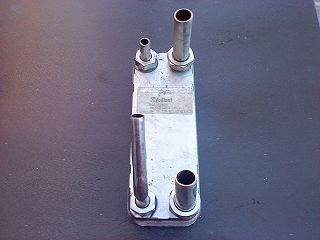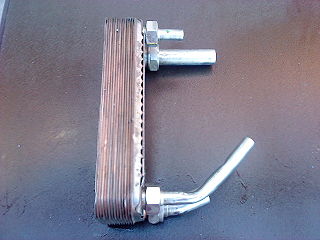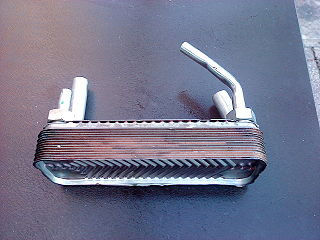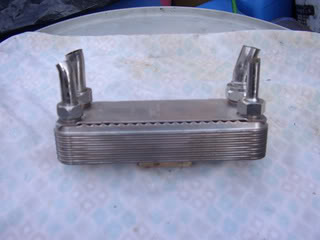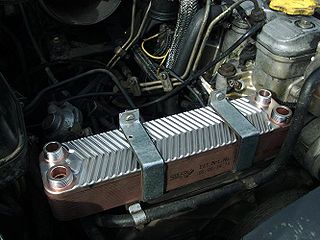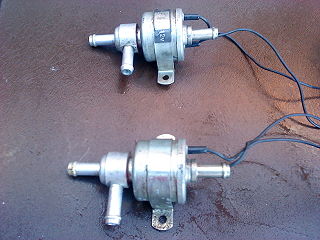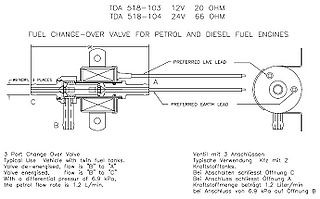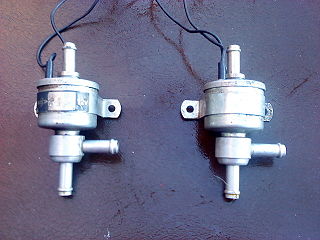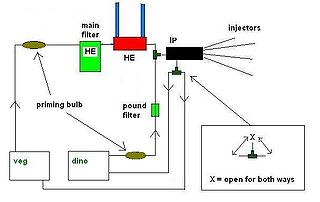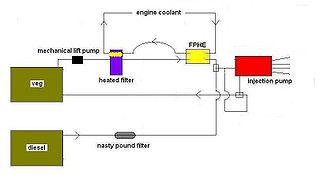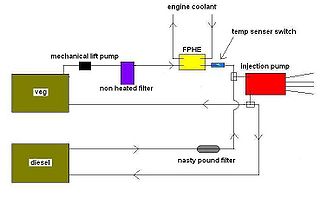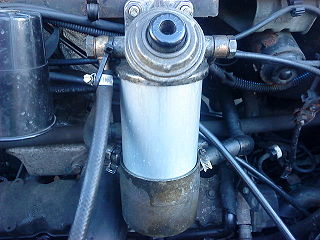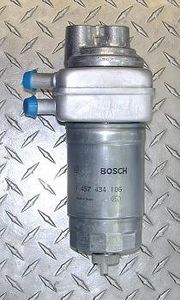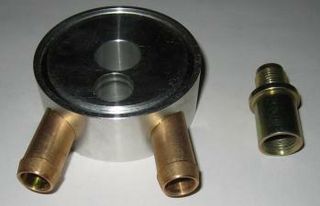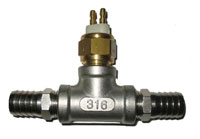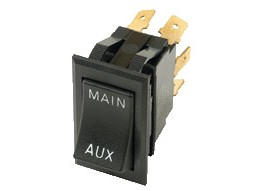Difference between revisions of "Heat exchangers and solenoid valves"
| (7 intermediate revisions by 2 users not shown) | |||
| Line 1: | Line 1: | ||
| + | <metadesc>Heat exchangers for vegetable oil, Solenoid valves for vegetable oil, Veg oil systems for car engines, Veg oil system diagram, WVO schematic, Running cars on cooking oil, Twin tank systems foe WVO, How to run a car on vegetable oil</metadesc> | ||
{{stub}} | {{stub}} | ||
| − | + | '''Twin-tank system.''' Parts and plumbing. | |
The vehicle is started on mineral Diesel, and then the valves switch over to an auxiliary veg tank when the engine reaches full temperature - the heat exchanger is used to raise the temperature of vegetable oil before it reaches the injection pump, using engine coolant to transfer heat across the plates of the heat exchanger. | The vehicle is started on mineral Diesel, and then the valves switch over to an auxiliary veg tank when the engine reaches full temperature - the heat exchanger is used to raise the temperature of vegetable oil before it reaches the injection pump, using engine coolant to transfer heat across the plates of the heat exchanger. | ||
| − | Before stopping the engine at the end of a journey, the system must be "Flushed or Purged" with mineral Diesel, making it safe to re-start ie: in the morning from a cold start few hours later. Short stops eg: 30 mins etc 99% of the time shouldnt need to purge/flush down, as the engine will still be upto optimum temperature. | + | Before stopping the engine at the end of a journey, the system must be "Flushed or Purged" with mineral Diesel, making it safe to re-start ie: in the morning from a cold start few hours later. Short stops eg: 30 mins etc 99% of the time shouldnt need to purge/flush down, as the engine will still be upto optimum temperature. (winter times may vary!) |
<gallery caption="Click pictures to enlarge" widths="320px" heights="300px" perrow="2" align="center"> | <gallery caption="Click pictures to enlarge" widths="320px" heights="300px" perrow="2" align="center"> | ||
| Line 27: | Line 28: | ||
File:bgxcad4.jpg|One of a number of ways for plumbing in a twin tank system. | File:bgxcad4.jpg|One of a number of ways for plumbing in a twin tank system. | ||
| − | File: | + | File:New-p.JPG|Twin tank system with heated filter and exchanger, plus a looped return to injection pump through heat exchanger. |
File:Temp-sender-twin-looped.jpg|Twin tank system returning both fuels to there individual fuel tanks. | File:Temp-sender-twin-looped.jpg|Twin tank system returning both fuels to there individual fuel tanks. | ||
| − | File: | + | File:DSC00345.JPG|Bottom heated filter + fuel priming button on top , and like the peugeot filter can be modded by removal of the thermostat. |
File:Filtside.jpg|Top heated filter ring. | File:Filtside.jpg|Top heated filter ring. | ||
| Line 37: | Line 38: | ||
File:Heat-ring.jpg|Heater ring that fits standard spin on cartridge type filters. | File:Heat-ring.jpg|Heater ring that fits standard spin on cartridge type filters. | ||
| − | File:Temp_switch_T.jpg|Temperature sensor electrically switches to live at 60c | + | File:Temp_switch_T.jpg|Temperature sensor placed inline with a coolant hose on a car/van, which electrically switches to live at 60c changing fuel valves from diesel to vegetable oil. |
File:SwitchVeg.jpg|Basic in-car switch for changeover from diesel to vegetable oil when optimum engine coolant temperature is reached avg: 80c. | File:SwitchVeg.jpg|Basic in-car switch for changeover from diesel to vegetable oil when optimum engine coolant temperature is reached avg: 80c. | ||
| Line 45: | Line 46: | ||
[[User:Rotary-Motion|Rotary-Motion]] 21:50, 5 December 2010 (UTC) | [[User:Rotary-Motion|Rotary-Motion]] 21:50, 5 December 2010 (UTC) | ||
[[Category:Vegetable oil]] | [[Category:Vegetable oil]] | ||
| + | [[Category:Vehicles & modifications]] | ||
Latest revision as of 16:35, 26 January 2014
Twin-tank system. Parts and plumbing.
The vehicle is started on mineral Diesel, and then the valves switch over to an auxiliary veg tank when the engine reaches full temperature - the heat exchanger is used to raise the temperature of vegetable oil before it reaches the injection pump, using engine coolant to transfer heat across the plates of the heat exchanger.
Before stopping the engine at the end of a journey, the system must be "Flushed or Purged" with mineral Diesel, making it safe to re-start ie: in the morning from a cold start few hours later. Short stops eg: 30 mins etc 99% of the time shouldnt need to purge/flush down, as the engine will still be upto optimum temperature. (winter times may vary!)
- Click pictures to enlarge
Rotary-Motion 21:50, 5 December 2010 (UTC)
